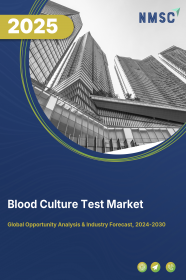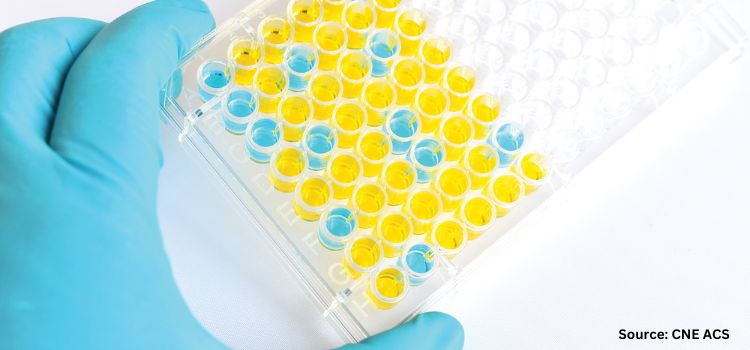
Blood Culture Test Market by Product (Software & Services, Consumables, and Instruments), by Technology (Culture Based Technology, Molecular Technology, Proteomic Technology, Microarrays, Polymerase Chain Reaction, and PNA-FISH), by Method (Automated Method and Conventional /Manual Method), by Application (Fungal, Micro-Bacterial, and Bacterial), and by End User – Global Opportunity Analysis and Industry Forecast 2023 - 2030
US Tariff Impact on Blood Culture Test Market
Trump Tariffs Are Reshaping Global Business
Market Definition
The global Blood Culture Test Market size was valued at USD 5.86 billion in 2023 and is predicted to reach USD 11.61 billion by 2030 with a CAGR of 10.3% from 2024 to 2030.
A blood culture test is a kind of laboratory test that examines microorganisms in the blood. The microorganisms may include bacteria, fungus, and viruses. It is performed by using a variety of devices, instruments, and products. Blood infections are commonly caused by bacteria that enter into the bloodstream from skin, urine, lungs, or gastrointestinal system. Blood culture test is used to detect presence of infection in the blood and it also helps to identify bacteria present in the bloodstream that indicates a blood infection known as bacteremia.
Market Dynamics and Trends
Rise in demand for blood culture test is attributed to increase in number of sepsis cases, which can be detected through blood test as sepsis releases a lot of chemicals into the blood and can damage multiple organ systems, leading them to fail. For instance, in the 2020 report on the global epidemiology and burden of sepsis, the World Health Organization (WHO) estimated that globally sepsis occurs in 49 million people each year, and is responsible for 11 million deaths.
Moreover, high incidences of bloodstream infections such as osteomyelitis, urinary tract infections, or pneumonia are expected to support growth of the blood culture test market. For instance, a report published by the WHO in November 2022, declared that in 2019 pneumonia caused death of 740,180 children under the age of 5, thus accounting for 14% of all deaths of children across the globe.
Moreover, introduction of various innovative products used in blood culture tests by key market players is expected to further propel the blood culture test market growth during the forecast period. For instance, in March 2022, Accelerate Diagnostics, Inc. announced launch of Accelerate Arc system, which comprises Arc Module and blood culture (BC) Kit. It is a device that automated a path to perform rapid and accurate microbial identification for positive blood cultures.
However, high-cost of automated blood culture instruments and lack of skilled professionals & laboratory technicians are expected to restrain growth of the market during the forecast period. On the contrary, introduction of advanced technologies such as molecular-based, which are either single-plex or multiplex Polymerase chain reaction (PCR) assays and other DNA amplification techniques are expected to create ample growth opportunities for the market in the coming years.
Market Segmentation and Scope of the Study
The blood culture test market report is segmented on the basis of product, technology, method, application, end user, and region. On the basis of product, the market is divided into software & services, consumables, and instruments. On the basis of consumables, it is sub-categorized into blood culture media, assay kits & reagents, and blood culture accessories.
Further, by blood culture media, the market divided into pediatric aerobic blood culture media, anaerobic blood culture media, aerobic blood culture media, fungi/yeast blood culture media and mycobacterial blood culture media. On the basis of technology, the market is divided into culture-based technology, molecular technology, proteomic technology, microarrays, polymerase chain reaction, and PNA-FISH. On the basis of method, the market is bifurcated into automated method, and conventional /manual method.
On the basis of application, the market is categorized into fungal, micro-bacterial, and bacterial. On the basis of end user, the market is categorized into academic research laboratories, reference laboratories, hospitals & diagnostic centers and other laboratories. Regional breakdown and analysis of each of the aforesaid segments includes North America, Europe, Asia-Pacific, and Row.
Geographical Analysis
North America holds a predominant share of the blood culture test market and is expected to continue its dominance during the forecast period. This is attributed to the presence of key manufacturers of blood culture test in the region such as Thermo Scientific Inc. and Merck. For instance, in June 2022, Thermo Fisher Scientific Inc. introduced EliA RNA Pol III and EliA Rib-P blood tests for diagnosis of autoimmune diseases such as Systemic Sclerosis (SSc) and Systemic Lupus Erythematosus (SLE).
Moreover, surge in cases of sepsis in the region, owing to rise in awareness and tracking of sepsis propels growth of the blood culture tests market. For instance, according to the Centers for Disease Control and Prevention (CDC) in 2021, 1.7 million adults in the U.S. suffer from sepsis and about 270,000 died due to this disease in the region.
Asia-Pacific is expected to show a steady rise in the market, owing to high prevalence of infectious diseases such as dengue, malaria, and HIV/AIDS and rise in disposable income of people. According to the Organization for Economic Cooperation and Development (OECD), Asia stands as the second region with the highest HIV prevalence, following sub-Saharan Africa. To combat this public health challenge, the United Nations has established a Sustainable Development Goal (SDG) with the aim of eradicating the AIDS epidemic as a significant threat by the year 2030.
In addition, patient awareness regarding various types of blood diseases, owing to increase in healthcare expenditure, along with increase in prevalence of blood cancer across various countries is expected to boost the market in this region. For instance, according to the WHO, in 2020, 13,667 people were suffering from leukaemia in Japan and this further demand the blood culture test in the region.
Competitive Landscape
The blood culture test industry comprises various market players such as Thermo Fisher Scientific Inc, Abbott Laboratories, Magnolia Medical Technologies, Becton Dickinson (BD) Siemens AG, Bayer Healthcare, Biomerieux, Bruker Corporation, Merck, and Beckman Coulter Inc. These market players are adopting various strategies such as product launches and partnership across various regions to maintain their dominance in the global market.
For instances, in January 2021, Bruker Corporation introduced MBT Sepsityper Kit US IVD, which enabled specific detection of many cases of bacteremia-induced sepsis to assist infectious disease present in the blood. In addition, in February 2020, Becton Dickinson (BD) and Babson Diagnostics, a transformative diagnostic blood testing company announced strategic partnership to bring laboratory-quality small-volume blood collection to retail pharmacies. The partnership reflects emerging health care trends toward faster and less expensive laboratory testing in customer-friendly health care settings with rapid growth in the diagnostic testing market.
Key Benefits
-
The report provides quantitative analysis and estimations of the blood culture test market from 2023 to 2030, which assists in identifying the prevailing market opportunities.
-
The study comprises a deep dive analysis of the blood culture test market including the current and future trends to depict prevalent investment pockets in the market.
-
Information related to key drivers, restraints, and opportunities and their impact on the global market is provided in the report.
-
Competitive analysis of the players, along with their market share is provided in the report.
-
SWOT analysis and Porters Five Forces model is elaborated in the study.
-
Value chain analysis in the market study provides a clear picture of roles of stakeholders.
Blood Culture Test Market Key Segments
By Product
-
Software & Services
-
Consumables
-
Blood Culture Media
-
Pediatric Aerobic Blood Culture Media
-
Anaerobic Blood Culture Media
-
Aerobic Blood Culture Media
-
Fungi/Yeast Blood Culture Media
-
Mycobacterial Blood Culture Media
-
-
Assay Kits & Reagents
-
Blood Culture Accessories
-
-
Instruments
By Technology
-
Culture Based Technology
-
Molecular Technology
-
Proteomic Technology
-
Microarrays, Polymerase Chain Reaction
-
PNA-FISH
By Method
-
Automated Method
-
Conventional /Manual Method
By Application
-
Fungal
-
Micro-Bacterial
-
Bacterial
By End User
-
Academic Research Laboratories
-
Reference Laboratories
-
Hospitals & Diagnostic Centers
-
Others
By Region
-
North America
-
U.S.
-
Canada
-
Mexico
-
-
Europe
-
UK
-
Germany
-
France
-
Italy
-
Spain
-
Rest of Europe
-
-
Asia-Pacific
-
China
-
India
-
Japan
-
South Korea
-
Australia
-
Rest of Asia-Pacific
-
-
RoW
-
UAE
-
Saudi Arabia
-
South Africa
-
Brazil
-
Others
-
Key Players
-
Thermo Fisher Scientific Inc
-
Abbott Laboratories
-
Magnolia Medical Technologies
-
Becton Dickinson (BD)
-
Siemens AG
-
Bayer Healthcare
-
Biomerieux
-
Bruker Corporation
-
Merck
-
Beckman Coulter Inc

















 Speak to Our Analyst
Speak to Our Analyst





















